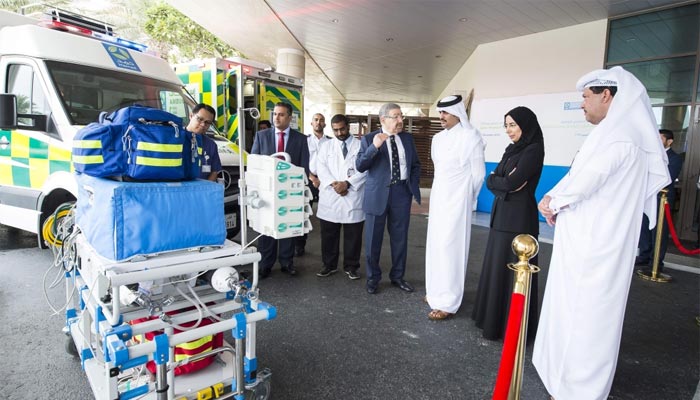HE the Minister of Public Health Abdullah bin Khalid al-Qahtani, HMC managing director Dr Hanan al-Kuwari and other officials at the inauguration of the Qatar Neonatal Transport Programme.
By Joseph Varghese
Staff Reporter
In a bid to reduce the mortality rate among the newborns in the country, the Hamad Medical Corporation (HMC) has launched the Qatar Neonatal Transport Programme, a first in the Middle East.
HE the Minister of Public Health Abdullah bin Khalid al-Qahtani, along with HMC managing director Dr Hanan al-Kuwari, inaugurated the programme at the Women’s Hospital on Tuesday.
The minister was also provided with a hands-on demonstration of the emergency transportation equipment for carrying the at-risk newborns.
The Qatar Neonatal Transport Programme is a nationwide emergency transportation service provided by Women’s Hospital and the HMC Ambulance Service to bring high-risk neonates to Women’s Hospital Neonatal Intensive Care Unit (NICU) for specialist tertiary treatment.
All the public and private hospitals across Qatar with facilities for baby births can avail this facility. These hospitals have to sign an agreement with the HMC and can use the emergency service for any newborns who are deemed at-risk.
“The Women’s Hospital NICU is the only tertiary care facility in the country catering to newborns," pointed out Dr al-Kuwari.
"The Qatar Neonatal Transport Programme offers all hospitals with birth units a crucial time-saving service to bring any at-risk babies to the specialist treatment available at Women’s Hospital as quickly as possible,” she explained.
The NICU at Women’s Hospital had recently been expanded as part of HMC’s facilities master plan, and include 107 cots for newborns, as well as four mother and baby rooms and a number of quiet rooms and support areas, Dr al-Kuwari added.
“HMC had successfully conducted a pilot programme for a period of 12 months in preparation for launching the programme," recalled Women's Hospital medical director Dr Hilal al-Rifai.
"The pilot programme brought forth a reduction in the mortality rate of newborns transported to the hospital. So it is imperative that this service should be offered on a permanent basis,” he stated.
Dr. al-Rifai anticipated that over 100 high-risk newborns will be transported to the specialist tertiary facilities at Women’s Hospital every year under the programme. The newborns could have congenital or surgical anomalies, respiratory distress or require emergency invasive surgery, he added.
Qatar Neonatal Transport Programme director Dr Fouad Abounahia said the programme involves a fully trained team on call round-the-clock, with state-of-the-art equipment stationed at the NICU ready to be deployed within 20 minutes.
“Once we receive a call from the referring hospital, the transport team is able to mobilise very quickly,” Dr. Abounahia added.

